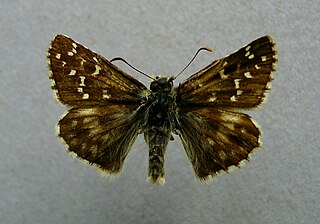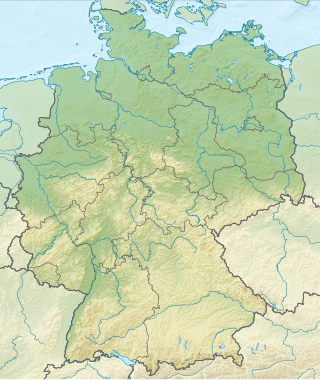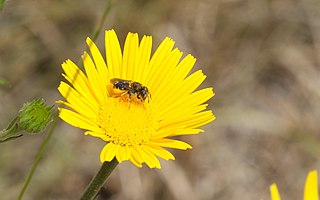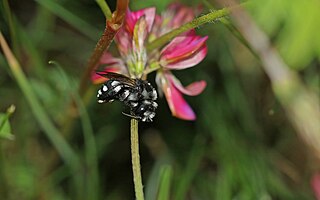
The dingy skipper is a species of butterfly in the family Hesperiidae.

The Large Grizzled skipper is a species of skipper butterfly.

Oberthür's grizzled skipper is a species of skipper.

Carcharodus alceae, commnly known as the mallow skipper, is a species of butterfly of the family Hesperiidae.

Bombus wurflenii is a species of bumblebee found in several parts of central and northern Europe to Turkey and the Crimea peninsula in the southeast.

Germany is a country in Central and Western Europe that stretches from the Alps, across the North European Plain to the North Sea and the Baltic Sea. It is the second-most populous country in Europe after Russia, and is seventh-largest country by area in the continent. The area of Germany ranked 63rd and covers 357,021 km2 (137,847 sq mi), consisting of 349,223 km2 (134,836 sq mi) of land and 7,798 km2 (3,011 sq mi) of waters, smaller than Japan but larger than Republic of the Congo.

The safflower skipper is a species of skipper butterfly.

Pyrgus malvoides, the Southern Grizzled Skipper, is a species of skipper.

Anthidium oblongatum, the oblong woolcarder bee, is a species of bee in the family Megachilidae, the leaf-cutter, carder, or mason bees.

The Central European mixed forests ecoregion is a temperate hardwood forest covering much of northeastern Europe, from Germany to Russia. The area is only about one-third forested, with pressure from human agriculture leaving the rest in a patchwork of traditional pasture, meadows, wetlands. The ecoregion is in the temperate broadleaf and mixed forest biome, and the Palearctic realm, with a Humid Continental climate. It covers 731,154 km2 (282,300 sq mi).

Hylaeus communis is a Palearctic species of solitary bee.

Tetralonia malvae, also known as the Mallow longhorn, is a species of insect belonging to the family Apidae. The bee takes pollen from oligolectic sources on the mallow family (Malvaceae).

Camptopoeum friesei is a species of bees of the genus Camptopoeum.

Anthophora bimaculata is a species of bee.

Pseudoanthidium tenellum is a species of bee in the family Megachilidae.

Osmia spinulosa, also known as the spined mason bee, is a species of bees within the genus Osmia.

Melecta luctuosa, also known as square-spotted mourning bee, is a species of bee within the family Apidae.

Tetraloniella dentata is a species of bees within the genus Tetraloniella.

Bombus mesomelas is a species of bumblebees.

Sichel's bumblebee is a species of bumblebee.





















